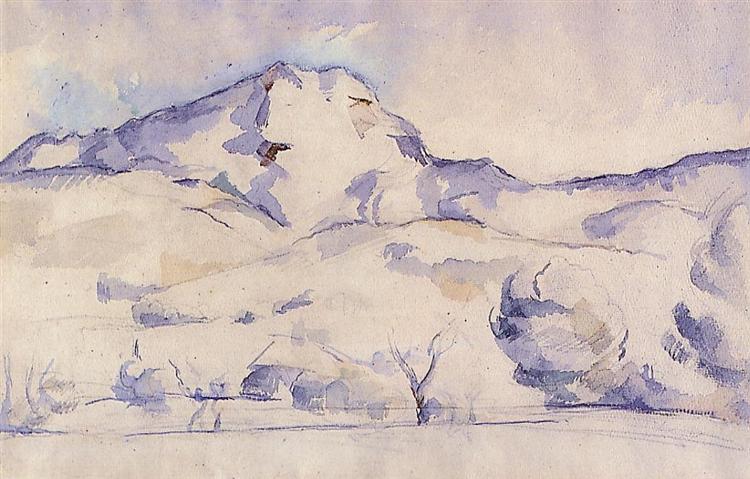Description
Paul Cézanne's painting "Mont Sainte-Victoire", created in 1887, stands as a sublime manifestation of the Provençal landscape that occupied a central place in the Post-Impressionist master's work. This painting, like many others by Cézanne, captures a unique view of the famous mount that rises majestically on the horizon of Aix-en-Provence. In this work, Cézanne deploys a composition that, although apparently simple, reveals a formal structure and chromatic richness that elevate it above mere landscape.
Cézanne employs a geometric approach to construct the form of Mont Sainte-Victoire, using a series of planes that suggest volume and depth. The peak is centered in the composition, dominating the space with its robust form, while the trees flanking the base of the mountain and the fields that stretch around complement the visual balance of the work. This interplay between the mountain and its surroundings reveals a meticulous attention to the landscape, as Cézanne begins the transition from Impressionism to a more structured style that anticipates modernism.
The colour palette is another notable element of this painting. Cézanne uses a combination of vibrant greens along with shades of blue and ochre, which not only suggests the luminosity of the landscape but also creates a sense of atmospheric depth. The brush strokes are visible and purposeful, adding a palpable texture to the surface of the painting. It is interesting to note how Cézanne manages to convey the whisper of light in nature through his application of colour, where each hue overlaps the next, generating a visual vibrancy effect.
In this work, unlike other depictions of landscapes from the same period, no human figures or narrative elements are incorporated. This absence of characters allows the viewer to fully immerse themselves in the experience of the landscape, fostering a more intimate and almost contemplative relationship with the natural environment. Cézanne seems to advocate the purity of the landscape itself, isolating the mountain as an almost sacred entity, a recurring theme in his work that reflects his fascination with nature and the search for the essential.
Mont Sainte-Victoire can also be understood as part of a series of works in which Cézanne explores different approaches to the same subject. This painting is one of several versions that the artist made throughout his life. Each one reveals a new understanding of form and light, and while this particular one is set within a specific time frame, the impact of its style continues to resonate in contemporary art.
In conclusion, the 1887 Mont Sainte-Victoire is a testament to Cézanne's ability to transform a familiar landscape into a powerful aesthetic statement. The work stands as a milestone in art history, marking a crucial transition towards more abstract forms of artistic expression. Through its composition, color, and the absence of human figures, it establishes a bridge between the real and the conceptual, inviting viewers to contemplate the very essence of nature and its artistic representation. Cézanne, with his unmistakable vision, managed to capture not only a place, but also an emotional state, making this work an undeniable gem of Post-Impressionism.
KUADROS ©, a famous painting on your wall.
Hand-made oil painting reproductions, with the quality of professional artists and the distinctive seal of KUADROS ©.
Painting reproduction service with satisfaction guarantee. If you are not completely satisfied with the replica of your painting, we will refund 100% of your money.

